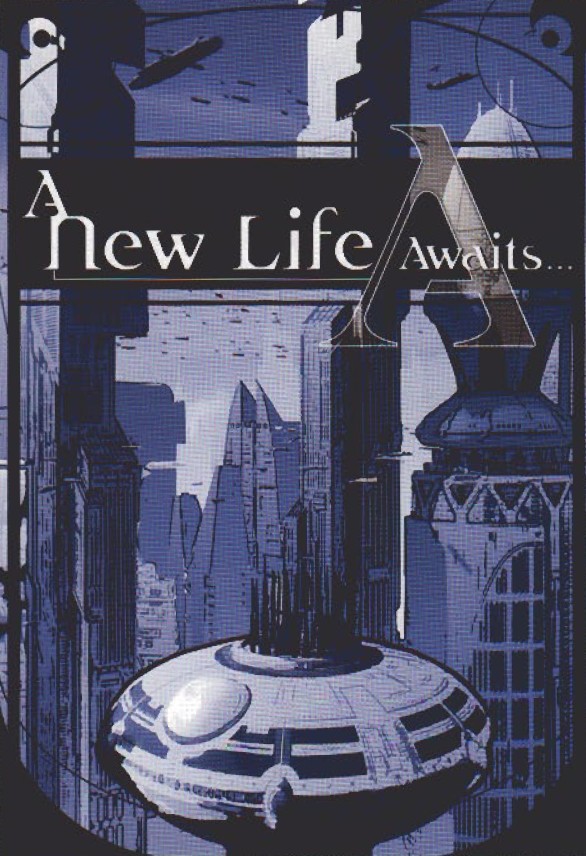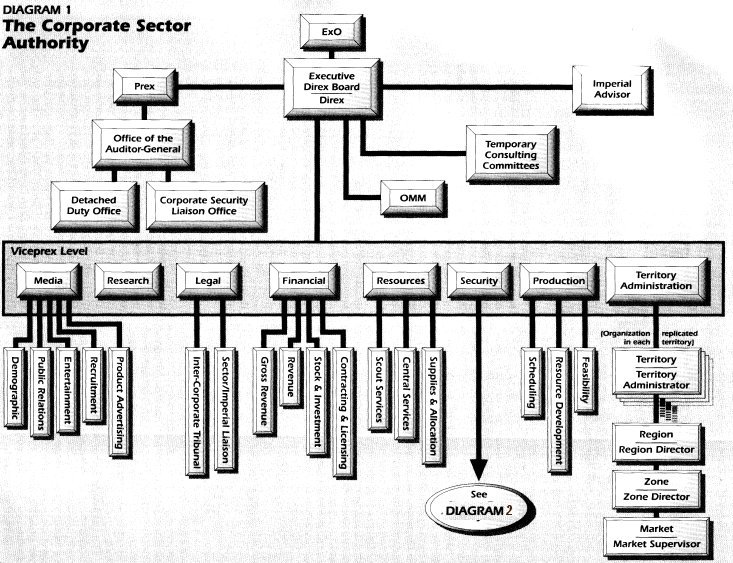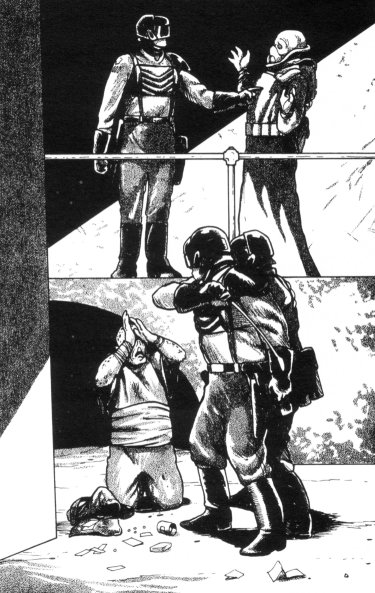The Corporate Sector Authority, commonly abbreviated to CSA, was a corporate authority that controlled the Corporate Sector, which was located in the galaxy's Outer Rim Territories. All economic, political and judicial systems were controlled by member corporations or corporate interest, who were charted to directly administer the sector.
The Corporate Sector Authority rooted in the Clone Wars when Supreme Chancellor Palpatine began to get in close contact with corporations in the Corporate Sector which were loyal to the Galactic Republic. By the end of the war, he gathered a group of sympathizing lobbyists known as the Galactic Corporate Policy League (GCPL), which would later on become the CSA, gaining him control over members of the CSA when he became Galactic Emperor.
During the Imperial Period, the CSA was never officially part of the Galactic Empire and therefore retained near-total control over internal affairs, although it was ultimately subordinate to the Empire which had heavy influence over it. The Empire also maintained official diplomatic relations with the CSA.
In 40 ABY, the CSA allied itself with a rebellion consisting of the planetoids Corellia, Commenor, Adumar, and Fondor for fighting against the Galactic Alliance during the Second Galactic Civil War.
In 44 ABY, the Corporate Sector Authority suffered a full slave revolt, as it was happening everywhere else in the galaxy.

CSA Propaganda efforts
The Corporate Sector was first formed in 490 BBY, in order to resolve differences between Galactic Republic lawmakers and the heads of many of the galaxy's largest corporations that largely existed in the Expansion Region. The Corporate Sector was established in the front end of the Tingel Arm region of the Outer Rim Territories and originally consisted of a few hundred star systems, all of which were supposedly devoid of sentient species. The corporations allowed to operate in the sector could purchase entire regions of space. However, they were meant to be supervised by the Galactic Republic.
In 403 BBY, the scouting vessel Commerce disappeared while attempting to make an orbital scan of the planet Nyriaan, in the Luire system.
In 84 BBY, the Corporate Sector Authority laid claim to the entire Luire system, however the Republic rebuffed their claim and for the duration of the resulting legal battle, a quarantine of Nyriaan was enforced. In 81 BBY, a Republic court ruled that the CSA only had jurisdiction over Caillte.
During the Clone Wars, the Deluge Experiment was initiated by the Corporate Sector Authority to alter the climate of Nyriaan after decades of research, and it was kept secret from high-ranking CSA members in order to protect them from prosecution in event of the scheme causing a serious loss of life. Ghurn, a Galactic Republic official, looked into the project after Klieri and Yrssk went missing while investigating.
Meanwhile, a group of lobbyists known as the Galactic Corporate Policy League, backed by such influential figures as Baron Tagge, began to get in close with then-Chancellor Palpatine, presumably representing the loyalist companies in the sector, although during the Clone Wars most of the Corporate Sector supported the Confederacy of Independent Systems.
After the Clone Wars resolution, the assets of most Separatist corporations were nationalized or given to loyal companies as a reward. Then several of Palpatine's influential corporate allies, led by Tagge, convinced the Emperor to expand the Corporate Sector to nearly 30,000 star systems, and with the signing of the Corporate Sector Charter, the Empire restructured the CSA to rule the newly-expanded sector. According to the official field manual for the Imperial Military forces, another part of the reason why the CSA was established was specifically to ensure that transparent mercantilism could occur without any interference, as the Empire approved of corporate competition so long as it didn't interfere with it.
The CSA took possession of many of the remaining droids belonging to the Confederacy following the Battle of Murkhana, and as per its agreement with the Empire paid an annual stipend of 3% of the sector's gross product, as well as a tithe of materials and ore produced. In the years after the war's end much of the surviving Corporate Alliance assets relocated to the Corporate Sector. Eleven sentient species were discovered in this expansion, though the Corporate Sector was careful to cover this fact up.
In 18 BBY, a union of pirates were launching raids into the recently reorganized CorpSec and the surrounding area, that forced the Empire to get involved in what was known as the Listehol Campaign. Admiral Wullf Yularen took command of a group of Invincible-class Dreadnaughts meant for the CSA and a small complement of Venators and TIE/LN starfighters, quickly defeating the raiders.
The CSA's encroachments upon surrounding systems did not always go unforgiven. The Kobok, a militaristic species, did not appreciate the CSA's claim on planets bordering their territory, and the two groups often fought in border disputes. Circa 15 BBY, the Koboks and the CSA engaged in open warfare. The Corporate Sector also came into conflict with the felinoid Trianii species. An armistice was eventually signed between the Corporate Sector and the Trianii three years after the start of the CSA–Trianii War.
During Emperor Palpatine's reign over the galaxy, many of the Corporate Sector's companies developed technologies for use by the Empire. However, following the Battle of Hoth a contributing company, Galactic Electronics, developed a new magnetic pulse warhead and sold it to the Rebel Alliance. In retaliation the Imperial Star Destroyer Glory invaded the sector and seized the corporation's deep-space research facility. During the Galactic Civil War, many people sought refuge in the Corporate Sector; however, it was not long before those people discovered that the Corporate Sector was far more stark than the Empire.
In the wake of the Battle of Endor and the Emperor's death, the Corporate Sector tried to remain neutral and sold products to both the New Republic and the remnants of the Empire. The New Republic, however, was too burdened with establishing a new government to sign a long-lasting partnership with the corporate-minded fiefdom — especially since some in the New Republic boycotted the CSA for being just as bad as, if not even worse, than the Empire.
After having captured the sectors surrounding the Corporate Sector in 6 ABY, Grand Moff Zsinj conquered the sector in 7 ABY. The Corporate Sector stayed under Zsinj's control until his death in 8 ABY.
During the Yuuzhan Vong War, all communication between the Corporate Sector and the rest of the galaxy was severed; however, the Sector was not invaded.
In 40 ABY, several of its member companies became allied with Corellia in the Second Galactic Civil War. By the time the war had ended a year later the whole government had been absorbed into the Confederation. In 43 ABY it was presumably a part of the Unification Summit that was led by Turr Phennir which made peace with the Galactic Alliance and the Imperial Remnant. In 44 ABY the Corporate Sector became one of many sectors in the Galaxy where there was a full slave revolt.

CSA organizational chart
The government of the Corporate Sector Authority was made up of several powerful corporations. These companies were managed by the Direx Board, which was made up of 55 members, all of whom were high-ranking business executives. The Direx Board was led by the ExO, or Executive officer, and other posts included Prex (President), Viceprex, Auditor-General and the Imperial Advisor that represented the interests of the Galactic Empire. The monetary authority of the Corporate Sector was the Authority Currency Exchange. Etti IV was the administrative center for the sector as well as a major trading crossroads.
As with its other client states, the Galactic Empire maintained an embassy in the Corporate Sector.
(For a list of companies that were affiliated with the Corporate Sector Authority, go here)
(For a list of companies that were signatory sponsors of the Corporate Sector Authority, go here)
The Corporate Sector Authority had much less racial discrimination than the Humanocentric Galactic Empire, although it advertised on the appeal of being free of alien interests. The prevailing culture of the Corporate Sector tended to value a being's financial status much more than their species of origin.
On the other hand, the Corporate Sector Authority historically violated the rights of sentient beings. The CSA possessed exclusive rights to use the sector's resources as it saw fit; the corporations within the region would typically strip a planet bare, often using slave labor or destroying the world's natural environment in the process. The majority of the Authority's residents consisted of the working class; citizenship, which granted limited "shareholder" rights, was purchased, putting it out of the reach of most laborers. Labor relationships were extremely poor, and most people lived in impoverished conditions; one of the most severe crimes in the Corporate Sector was to form, or even attempt to organize, a labor union.

Espos terrorizing citizens
The Security Division of the Corporate Sector Authority was responsible for law enforcement of it territories. The police of the CSA, known as Espos, had a reputation for brutality. Many of those convicted of political crimes within the Sector were sentenced to terms at a secret prison called Stars' End.
The Security Division also maintained a large fleet to patrol their territory, that consisted of relatively outdated vessels bought from various Imperial fleets and Imperial surplus stock. The fleet's operators were trained by advisors from system defense navies that still utilized the aging designs. Ships included first-generation Victory-I-class Star Destroyers, Invincible-class Dreadnaught cruisers, second-hand Lucrehulk-class battleships, Recusant-class light destroyers and Marauder-class corvettes. The Authority IRD was one of the numerous types of starfighters used by the Security Division, as was the former CIS Mankvim-814 light interceptor. The CSA began purchasing large numbers of Dreadnaught-class heavy cruisers as soon as they were developed. At some point prior to the Battle of Yavin, the CSA military sold a number of its older Marauder corvettes to the fledgling Rebel Alliance.
The Corporate Sector encompassed the area of the Aparo and Wyl sectors in the northeast quadrant of the Outer Rim. The region was chosen for widespread economic development by the Galactic Republic for its lack of native sentient life, a notion that would later prove to be untrue.
The worlds of the Corporate Sector included Ammuud, Bonadan, Roonadan, Bretta, Duroon, Etti IV, Kalla VII, Kail, Kir, Orron III, Knolstee, Maryo, Mytus VII, Gaurick, Rampa III, Reltooine, Saffalore, Ulicia, Abo Dreth, Craci, Drog II, Erysthes, Kuminphal, Mall'ordian, Ession, Matra VI, Oslumpex V, Brosi, Colsa, Mos, Thosa, Tol, and the Trianii colonies of Trian, Fibuli, Ekibo, Pypin and Brochiib. The Corporate Sector Authority was known to ravage entire ecosystems in their hunt for profits.